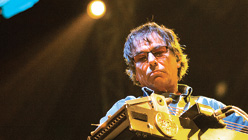On working with sick children and his character Drumbohead:
“I really don’t instruct when I go in. We become one and we try to pulse together. I really don’t talk too much. I put the red nose on and suddenly I’m from the planet Drum. ‘I’m really happy to be here on my first day on this planet. I really like your planet.’ I just try to create something other and they just start to drum, they start to pulse, and as they start to pulse, their face lights up with hope and the pains go away, for a while anyway. And it reinvigorates them and sometimes it reconnects them…it’s not about drums and drumming it’s about the rhythym and what the rhythm does neurologically.”
On playing at the Fillmore:
“It’s not quite like the old Fillmore. It doesn’t smell the same, it doesn’t look the same. But yeah, it’s kind of a nice feeling, going back to where we were birthed, as it were.
On politics, Nancy Pelosi, and Jared Huffman:
“There’s an environmental bend to all of this, and a health bend as well. And so these people are pushing that agenda and I will support them as long as they do that. I’ve known Nancy for 30 years and Jared is an up and comin’ and he’s going to do some really good work in D.C. I mean, you have to make a difference, you have to work for change or else it will just change on its own. Remember Wes ‘Scoop’ Nisker — ‘If you don’t like the news, go out and make some of your own.'”
Advice on Drugs:
“Moderation — you should consider that in anything you do. And know your sources. That’s another thing — if you are going to experiment with psycho-active drugs or whatever, know where you’re getting it from… I knew the chemist. He actually worked for me. And so I knew exactly what I was doing, everytime I did it. There was no guess work, we were professionals at this. So it’s different with me — I never bought drugs on the street or anything. I wouldn’t do that. It’s too dangerous, who knows what you’re getting?”
On collaborating with Zakir Hussain:
“Zakir Hussain is probably the most developed person on the planet, rythymically speaking. He comes from a long tradition of drummers, [his] father, Alla Rakha was my teacher back in 1967 and kind of introduced me to all the intricacies of the grove. I brought that back to the Grateful Dead and we changed from a blues band into the Grateful Dead. Very, very influential his father. His father — soft, older gentleman, he said ‘My son, he could play with you and you will enjoy it.’ So he brought Zakir to California when he was a kid, 17 I think, and we lived together and that’s where our relationship started. He says that I got him funky, taught him to relax and to breathe as opposed to playing so perfectly. And I wonder what I could have taught Zakir… but we had passion and we loved each other and so we created some historic works over the years.”
On the healing power of music:
It’s four words — it’s the rhythm stupid. You know, that’s what I always say to anyone and myself as well. It all goes back to that. We are rhythm machines, embeded in a universe of rhythm . It stands to reason that there has to be some resonance with all of that.
